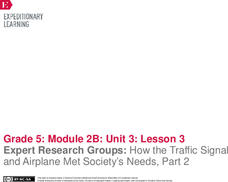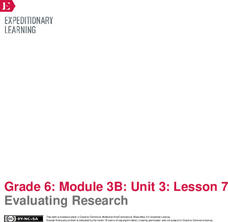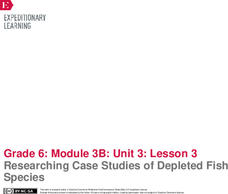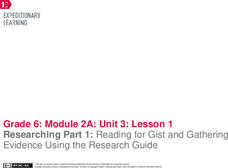EngageNY
Expert Research Groups: How the Traffic Signal and Airplane Met Society’s Needs, Part 2
Ready, set, act! Using the fun resource, pupils patriciate in a vocabulary charades activity to practice key terms from the unit. Next, scholars work in expert research groups to read an article about the invention of the traffic signal...
EngageNY
Performance Task: Hosted Gallery Walk of Scientific Posters
The guests have arrived. Scholars participate in a hosted gallery walk, using their scientific posters to share their research about DDT with their classmates. Then, using sticky notes, individuals leave positive feedback on their peers'...
EngageNY
Finishing Poster and Preparing for Gallery Walk
Practice makes progress! Using their drafts and resources from the previous lesson, pupils complete scientific posters for an upcoming gallery walk. Next, they practice presenting their posters to assigned partners.
EngageNY
Planning Content of Informative Consumer Guide: Sustainable Fishing Methods
There's no such thing as over-planning. In preparation for their informative consumer guides, scholars complete a Quote Sandwich graphic organizer to compile their information about sustainable fishing methods. Next, volunteers share...
EngageNY
Planning Content of Informative Consumer Guide: The Issue of Overfishing and Fish Depletion
Let's get organized! Pupils organize the information they have gathered about overfishing into a Quote Sandwich graphic organizer in preparation for their informative consumer guides. Next, they engage in a pair share activity to discuss...
EngageNY
Evaluating Research
Calling all archaeologists! Scholars dig through their research about overfishing, searching for the best information to include in their consumer guides. Next, pupils engage in a pair-share activity to discuss their findings with a...
EngageNY
Mid-Unit 3 Assessment, Part 2: Explaining How New Information Connects to the Topic
Let's talk it out. Using the resource, scholars work in triads to discuss how their research has deepened their understanding about sustainable fishing. Next, pupils engage in a whole-class discussion to consider their next steps toward...
EngageNY
Mid-Unit 3 Assessment Part 1: Researching Information about Buying Fish Caught Using Sustainable Methods
Sustainable seafood is not an oxymoron. Pupils watch a video about how consumers purchase seafood responsibly. Then, using resources in their assessment research folders, they complete a graphic organizer to record factual information...
EngageNY
Researching Case Studies of Depleted Fish Species
There's something fishy going on in the ocean. Using the resource, scholars engage in a jigsaw activity, researching a case study of a depleted fish species. After completing their research, each triad partners with another group to...
EngageNY
Researching Information about Overfishing
Imagine a world without Nemo and Dory. Using the resource, pupils engage in a jigsaw activity, working in triads to research information about overfishing. They watch a video about overfishing, complete a graphic organizer, read relevant...
EngageNY
Researching Information about Sustainable Fishing
Go fish! Scholars continue using their research skills to find factual information to use in their consumer brochures about overfishing. They work in triads to research information about sustainable fishing practices and share their...
EngageNY
Researching Facts
How did the 1906 San Francisco earthquake and fire affect the city's inhabitants? Scholars embark on a quest to discover the answer as they work in small groups to research articles about the event. They finish by completing a jigsaw...
EngageNY
Mid-Unit 3 Assessments, Part 2: Summarizing, Analyzing and Discussing Research
Why is reading important? As part of the mid-unit assessment, scholars read, summarize, and analyze an article about the importance of reading. Additionally, they continue their discussion about whether their rules to live by should be a...
EngageNY
Mid-Unit 3 Assessments, Part 1: Summarizing, Analyzing and Discussing Research
Speak up and listen up. Scholars participate in a speaking and listening mid-unit oral assessment. They discuss whether their rules to live by should be a personal choice or made into a law, and then they complete an exit ticket to...
EngageNY
Researching Part 1: Reading for Gist and Gathering Evidence Using the Research Guide
If only life came with an owner's manual. Pupils assemble with their research teams to discuss which of Steve Jobs' rules to live by most resonates with them. Scholars also read informational texts in pursuit of finding the gist and...
EngageNY
Forming a Research-Based Claim: Stakeholder Chart on Better Agricultural Water Management
How can industries manage water more sustainably? Building on the previous activity, scholars explore the topic by creating a stakeholder chart for agricultural water management. Next, they participate in the World Café discussion...
EngageNY
Forming a Research-Based Claim: Stakeholder Chart on Better Industrial Water Management
It's time to stake a claim! Working with partners, scholars create stakeholder charts for better industrial management of water. As they complete the chart, pupils consider an option for managing water more sustainably, identify...
EngageNY
Forming a Research-Based Claim: Cascading Consequences Charts
Life is all about choices and consequences. Using a Cascading Consequences chart, scholars create a visual map of the effects of a particular choice or action related to water management. With their researcher's notebooks and copies of...
EngageNY
Gathering Information about Water Management: Assessing and Reading Internet Sources, Day 3
Water is life! Using the informative resource, scholars first read two informational articles about water management in agriculture. Then, they use a Venn diagram to contrast the different types of evidence authors use to support a...
EngageNY
Gathering Information about Water Management: Assessing and Reading Internet Sources, Day 2
Accuracy, credibility, timeliness ... it's time to act on source reliability! Pupils continue conducting Internet research, selecting two questions about water management from their researcher's notebooks that they want to explore...
EngageNY
Using Effective Search Terms: Researching Water Management
Discover how to use search terms effectively! Scholars continue their exploration of Charles Fishman's The Big Thirst, engaging in a read aloud and then answering text-based questions. Next, pupils learn about using search terms and...
EngageNY
Gathering Information about Water Management: Assessing and Reading Internet Sources, Day 1
It takes time to discover what makes a source accurate and credible. Using everything they've learned about source credibility, scholars begin researching supporting questions about how industry and agriculture manage water. They select...
EngageNY
Mid-Unit Assessment, Part II: Research Task: Comparing and Contrasting Texts
When it comes to comparing texts, it's apples to oranges. As part two of the mid-unit assessment, learners compare and contrast two texts about the Internet and brain health. While reading, scholars use a Venn diagram to compare two...
EngageNY
Using Effective Search Terms: Researching Screen Time
The proof is in the reading. Scholars read an article, "Attached to Technology and Paying the Price," and answer text-dependent questions. Next, they complete a Venn diagram to contrast two authors' use of evidence on the topic of screen...

























